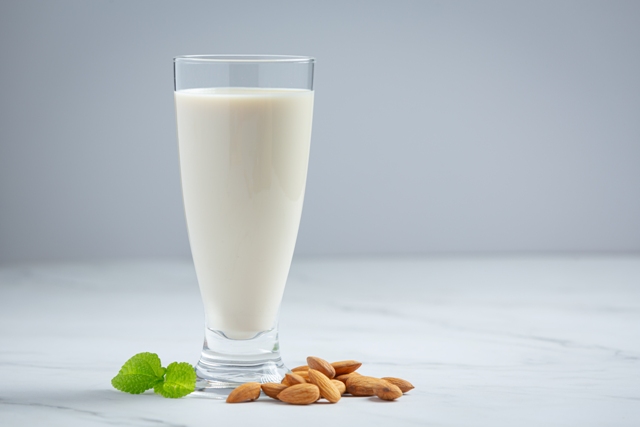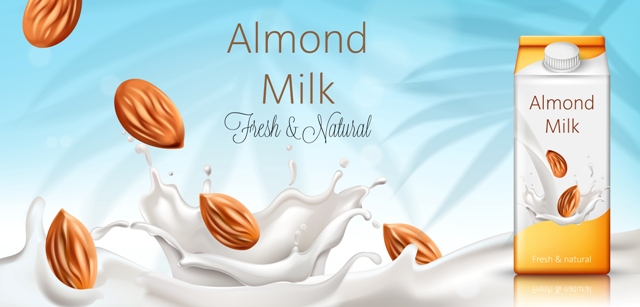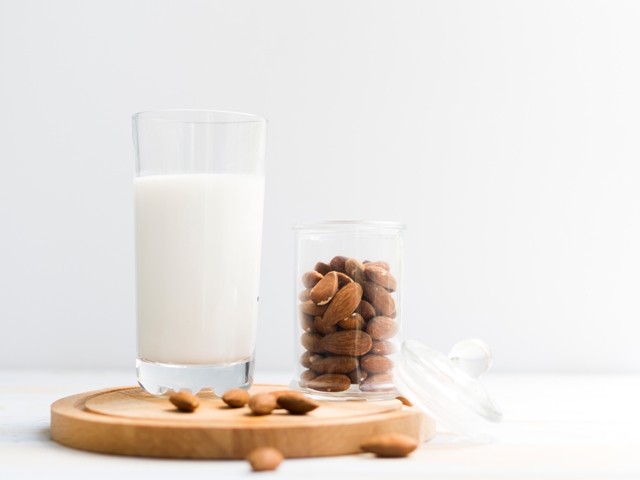Almond milk is a nutritious beverage obtained from blending almonds with water. It has a creamy texture and a nutty flavor similar to regular milk but it is not a dairy product as it does not contain lactose thus it is used as a suitable alternative for those individual who suffer from lactose intolerance.
How it is prepared?
It is widely available in market and it can be prepared at home as well
Below points will discuss about the home based methods of preparing almond milk –
- At first almonds should be blanched properly for removing the husks
- Then it should be ground to form fine powder with the help of food processor
- After that the ground powder should be soaked into water for quite a few hours
- Then it should be filtered with the help of cheesecloth
- The liquid, which is obtained finally, is known as almond milk

Nutritional profile
- It contains lesser amount of carbohydrate thus it is considered as low glycemic food. Being low glycemic food it can be easily incorporated in the diet of diabetic patients
- It contains significant amount of fibre as well
- It is also rich in proteins and contains various important amino acids
- It also contains lesser amount of fats. It mainly composed of unsaturated fat (both PUFA and MUFA) but contains some saturated fat as well
- It does not provide too much calories on its oxidation due to its low carbohydrate and fat contents thus it is also considered as low calorie beverages
- It is loaded with various important micronutrients like Vitamin E, Vitamin B complex, calcium, magnesium, manganese, potassium, phosphorus, copper, iron and zinc
- It also contains polyphenolic compounds and flavonoids that are responsible for exerting antioxidant activity, anti-inflammatory activity and anti-carcinogenic activity

Health benefits
Role on immunity
- Consumption of almond milk is very beneficial for maintaining a healthy immune system
- Its protein components play significant role in stimulating the synthesis of immunoglobulins, which ultimately help in improving immunological responses of the body. It is also associated with promoting the recognition process as well as binding of antibody to antigen
- It helps in decreasing the prevalence of infectious diseases as it helps the body to fight against infection in an effective manner. On the other hand it is also related with increasing the resistance power of the body that helps to decrease the susceptibility of becoming ill
Role on skeletal health

- It is considered as an imperative therapeutic substance for skeletal health as it contains significant amount of calcium, which is essentially required by the body for healthy bone formation
- Apart from calcium, it is consisting of various other nutrients like Vitamin K, magnesium, manganese, zinc and copper, which all are responsible for improving the health and activity of skeletal system
- Its magnesium component is accountable for increasing calcium uptake by the body, which helps in bone mineralization that subsequently enhances bone mineral density and bone mass. Thus its consumption is thought to be very effective for inhibiting bone thinning that prevents the prevalence of bone fractures
- Copper present in almond milk helps in maintaining healthy bones and it also helps to prevent osteoporosis
- Its zinc component is accountable for providing a stimulatory effect on osteoblastic bone formation as well as mineralization
- Moreover consumption of almond milk is really very effective for enhancing bone health and it also aids in reducing the prevalence of bone disorders
Role on weight management
- Individual who want to reduce their body weight should include almond milk in their diet
- Its protein and fibre components are considered as the principal components that help in weight reduction. Both of these two nutrients are responsible for delaying stomach emptying that help to make an individual full for long period of time as a result hinder appetite thus prevent over consumption that leads to weight reduction
- Its fibre content is also accountable for decreasing total cholesterol concentration of body thus helps in reducing the prevalence of visceral obesity
- Being a low calorie beverage it does not increase the risk of gaining weight thus its consumption is thought to be very effective for maintaining an ideal body weight as well

Role on digestive health
- It plays significant role in improving digestion
- Its fibre content is responsible for promoting regularity as it is associated with improving bowel movement and stool mass. It is also accountable for making the stool soft as a result makes the defecation relatively easier
- It is related with increasing peristalsis as well, which helps in promoting colonic health. Its consumption is also very effective for decreasing the prevalence of diverticular disease
- It helps in improving gut health by increasing the number of intestinal beneficial microbes

Role on muscular health
- It plays important role in improving muscular health
- Proteins and micronutrient components of almond milk are considered as primary nutrients involve in proper growth and development of muscles
- Calcium component of almond milk helps in muscle contraction
- It helps in improving muscle mass
- It is also associated with enhancing muscular strength thus helps in improving endurance
- It helps in muscle healing as well

Role on skin
- Consumption of almond milk is very effective for improving skin health
- It contains significant amount of Vitamin E that plays vital role in nourishing the skin
- Vitamin E of almond milk also acts as antioxidant, which helps to protect the skin from free radical induced oxidative damages as a result decreases the prevalence of dermal disorders
- Apart from Vitamin E, it contains various other micronutrients as well as protein, which are also accountable for making the skin healthy and supple
- It helps to moisturize the skin as well
- It is also associated with improving skin glow
Therapeutic uses
It is extensively used for various therapeutic purposes, like –
- It is widely used as an imperative therapeutic substance for cardiac health. Its protein, fibre, micronutrient components and antioxidant activities are accountable for promoting cardiac health and functionality
- Its potassium content is accountable for preventing hypertension
- Its magnesium component helps in maintaining normal heart beat
- Its cholesterol lowering effect is also responsible for decreasing the prevalence of atherosclerosis by inhibiting fat deposition within blood vessels, which helps to reduce the risk of developing coronary artery disease later in life
- B vitamins present in almond milk help in boosting up the metabolism of the body, which ultimately promotes wellbeing
- It is also associated with improving the activity of nervous system. Its protein and B vitamin components help in the growth and development of brain
- It is considered as a healthy option for diabetic patients as well. Its low sugar content and fibre contents are responsible for decreasing postprandial blood sugar load

Culinary uses
It can be consumed alone or can also be consumed in various ways, like –
- It can be consumed with oats or muesli
- It can also be consumed with coffee, tea and hot chocolates
- It can be used for preparing smoothie
- It can also be used for preparing pancakes or muffins
- It can be used in dressings too
Risk factors
Individual suffer from thyroid problems or who have tree nut allergies should avoid its consumption.

Source:
Bernat, N., Cháfer, M., Chiralt, A. and González-Martínez, C., 2015. Development of a non-dairy probiotic fermented product based on almond milk and inulin. Food Science and Technology International, 21(6), pp.440-453.
Dhakal, S., Liu, C., Zhang, Y., Roux, K.H., Sathe, S.K. and Balasubramaniam, V.M., 2014. Effect of high pressure processing on the immunoreactivity of almond milk. Food Research International, 62, pp.215-222.
Kundu, P., DhANKhAr, J. and ShArMA, A., 2018. Development of non dairy milk alternative using soymilk and almond milk. Current Research in Nutrition and Food Science Journal, 6(1), pp.203-210.
Lipan, L., Rusu, B., Sendra, E., Hernández, F., Vázquez‐Araújo, L., Vodnar, D.C. and Carbonell‐Barrachina, Á.A., 2020. Spray drying and storage of probiotic‐enriched almond milk: probiotic survival and physicochemical properties. Journal of the Science of Food and Agriculture, 100(9), pp.3697-3708.
Savchuk, Y., Usatyuk, S. and Smirnova, E., 2015. Health benefits of almond milk (Doctoral dissertation).
Stall, S. and Adams, G., 2017. Can almond milk be called milk?. Journal of Renal Nutrition, 27(3), pp.e15-e17.









